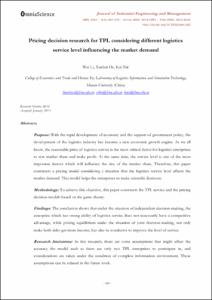Mostra el registre d'ítem simple
Pricing decision research for TPL considering different logistics service level influencing the market demand
| dc.contributor.author | Li, Wei |
| dc.contributor.author | He, Xuehui |
| dc.contributor.author | Nie, Kai |
| dc.date.accessioned | 2013-04-08T10:08:56Z |
| dc.date.available | 2013-04-08T10:08:56Z |
| dc.date.issued | 2013-04 |
| dc.identifier.citation | Li, Wei; He, Xuehui; Nie, Kai. Pricing decision research for TPL considering different logistics service level influencing the market demand. "Journal of Industrial Engineering and Management", Abril 2013, vol. 6, núm. 1, p. 267-275. |
| dc.identifier.issn | 2013-0953 |
| dc.identifier.uri | http://hdl.handle.net/2099/13125 |
| dc.description.abstract | Purpose: With the rapid development of economy and the support of government policy, the development of the logistics industry has become a new economic growth engine. As we all know, the reasonable price of logistics service is the most critical factor for logistics enterprises to win market share and make profit. At the same time, the service level is one of the most important factors which will influence the size of the market share. Therefore, this paper constructs a pricing model considering a situation that the logistics service level affects the market demand. This model helps the enterprises to make scientific decisions. Methodology: To achieve this objective, this paper constructs the TPL service and the pricing decision models based on the game theory. Findings: The conclusion shows that under the situation of independent decision-making, the enterprise which has strong ability of logistics service does not necessarily have a competitive advantage, while pricing equilibrium under the situation of joint decision-making, not only make both sides get more income, but also be conducive to improve the level of service. Research limitations: In this research, there are some assumptions that might affect the accuracy the model such as there are only two TPL enterprises to participate in, and considerations are taken under the condition of complete information environment. These assumptions can be relaxed in the future work. Originality: In this research, logistics service level is taken account into the areas of logistics service pricing, which makes the models more practical and more perfect. And this paper constructs game models based on game theory to make up the limitations of traditional pricing theories in logistics service pricing. |
| dc.format.extent | 9 p. |
| dc.language.iso | eng |
| dc.publisher | School of Industrial and Aeronautic Engineering of Terrassa (ETSEIAT). Universitat Politècnica de Catalunya (UPC) |
| dc.rights | Attribution-NonCommercial 3.0 Spain |
| dc.rights.uri | http://creativecommons.org/licenses/by-nc/3.0/es/ |
| dc.subject | Àrees temàtiques de la UPC::Economia i organització d'empreses::Direcció d'operacions::Modelització de transports i logística |
| dc.subject.lcsh | Business logistics -- Prices |
| dc.subject.lcsh | Game theory |
| dc.subject.other | Third Part Logistics (TPL), Service level |
| dc.subject.other | Service price |
| dc.title | Pricing decision research for TPL considering different logistics service level influencing the market demand |
| dc.type | Article |
| dc.subject.lemac | Logística (Indústria) -- Preus |
| dc.subject.lemac | Jocs, Teoria de |
| dc.identifier.dl | B-28744-2008 |
| dc.description.peerreviewed | Peer Reviewed |
| dc.rights.access | Open Access |
| local.citation.author | Li, Wei; He, Xuehui; Nie, Kai |
| local.citation.publicationName | Journal of Industrial Engineering and Management |
| local.citation.volume | 6 |
| local.citation.number | 1 |
| local.citation.startingPage | 267 |
| local.citation.endingPage | 275 |
Fitxers d'aquest items
Aquest ítem apareix a les col·leccions següents
-
2013, vol. 6, núm. 1 [32]
Special Issue – LISS 2012


